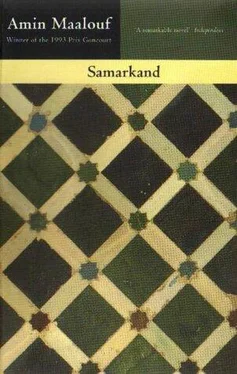One of Nizam’s twelve sons, who was present during the scene, thought it clever to intervene:
‘During the early days of Islam, when the Caliph Omar was accused of spending all the gold that had been amassed during the conquests, Omar asked his detractors: “Is this gold not the bounty of the Almighty who lavished it upon us? If you believe God is incapable of granting any more, then spend none of it. As for me, I have faith in the infinite generosity of the Creator and will not keep in my coffer a single coin which I could spend for the welfare of the Muslims.”’
Malikshah, however, had no intention of following this example. He was mulling over an idea of whose merits Hassan had convinced him. He ordered:
‘I demand to be presented with a detailed summary of everything which goes into my Treasury and the precise way that it is spent. When can I have it?’
Nizam seemed overwhelmed.
‘I can provide this summary, but it will take time.’
‘How long, khawaja ?’
He had not said ata but khawaja — a very respectful title, but in this context so distant that it sounded very much like a repudiation or a prelude to disgrace.
Distraught, Nizam explained:
‘An emissary will have to be sent to every emir to carry out long calculations. By the grace of God, the empire is immense, and thus it would be difficult to draw up this report in less than two years.’
Hassan, however, approached solemnly:
‘I promise our master that if he provides me with the means, if he orders all the papers of the diwan to be put into my hands, I will present him a completed report in forty days time.’
The Vizir wanted to respond, but Malikshah had already arisen. He strode towards the door and raised his voice:
‘Very well, Hassan will be installed in the diwan . The whole secretariat will be under his orders. No one will enter without his permission. In forty days time I will conclude the matter.’
Soon the whole empire was in an upheaval, the administration was paralysed, troop movements were reported and people spoke of civil war. It was said that Nizam had distributed arms in certain districts of Isfahan. In the bazaar, the merchandise had been stored away. The gates of the principal souks, notably that of the jewellers, were closed at the beginning of the afternoon. In the neighbourhood of the diwan the tension was at its greatest. The Grand Vizir had had to hand over over his offices to Hassan, but his residence adjoined them and only a small garden separated him from what had become the territory of his rival. Now the garden had been transformed into a veritable barracks, and Nizam’s personal guard patrolled it nervously, armed to the teeth.
No one was more embarrassed than Omar. He wanted to intervene to calm spirits down and to find a way for the two adversaries to compromise. Even though Nizam continued to receive him, he missed no occasion to reproach him for the ‘poisoned gift’ which he had made him. Hassan on the other hand spent his time locked up with his papers, busy preparing the report which he had to present to the Sultan. Only at night did he allow himself to stretch out on the large carpet of the diwan , surrounded by a handful of his trusty men.
Three days before the fateful day, Khayyam still wanted to attempt a final mediation. He went to Hassan’s apartments and insisted upon seeing him, but he was asked to come back one hour later as the sahib-khabar was holding a meeting with the treasurers. Omar decided that he would take a few steps outside, and had just passed through the doorway when one of the royal eunuchs, dressed all in red, addressed him:
‘If khawaja Omar would be so kind as to follow me, he is expected.’
After the man led him through a labyrinth of tunnels and staircases, Khayyam found himself in a garden of whose existence he had had no suspicion. Peacocks strutted around free, apricots trees were in blossom and a fountain murmured. Behind the fountain they came to a low door encrusted with mother-of-pearl. The eunuch opened it and invited Omar to proceed.
It was a vast room with brocade-lined walls, and at one end it had a sort of vaulted niche protected by a curtain, which fluttered indicating someone’s presence behind it. Khayyam had hardly entered before the door was shut with a muffled sound. Another minute of waiting and confusion ensued before a woman’s voice was heard. He did not recognise it, but he thought he could identify a certain Turkish dialect. However, the voice was low and the speech was rapid with only a few words emerging like rocks in a flood. The gist of the discourse escaped him and he wanted to interrupt her and ask her to speak in Persian or Arabic, or just more slowly, but it was not so easy to address a woman through a curtain. Suddenly another voice took over:
‘My mistress, Terken Khatun, the wife of the Sultan, thanks you for having come to this meeting.’
This time the language was Persian, and the voice was one that Khayyam would recognize in a bazaar on the Day of Judgement. He was going to shout, but his shout quickly turned into a happy but plaintive murmur:
‘Jahan!’
She pulled aside the edge of the curtain, raised her veil and smiled, but with a gesture prevented him from drawing close to her.
‘The Sultana,’ she said, ‘is worried about the struggle unfolding within the diwan . Disquiet is spreading and blood is going to be spilled. The Sultan himself is very concerned about this and has become irritable. The harem resounds with his bursts of anger. This situation cannot last. The Sultana knows that you are attempting to do the impossible and reconcile the two protagonists, and she desires to see you succeed, but such success seems distant.’
Khayyam concurred with a resigned nod of his head. Jahan continued:
‘Things having come so far, Terken Khatun considers that it would be preferable to dismiss the two adversaries and to confer the vizirate upon a decent man who can calm spirits down. Her spouse, our master, is surrounded, according to her, with schemers, but he just needs a wise man who is devoid of base ambition, a man of sound judgement and excellent counsel. As the Sultan holds you in high esteem, she would like to suggest to him that he name you Grand Vizir. Your nomination would relieve the whole court. Nevertheless, before putting forward such a suggestion, she would like to be assured of your agreement.’
Omar took some time to digest what was being asked of him, but he called out:
‘By God, Jahan! Are you after my downfall? Can you see me commanding the armies of the empire, decapitating people or quelling a slave revolt? Leave me to my stars!’
‘Listen to me, Omar. I know that you have no desire to conduct affairs of state, your role will be simply to be there! The decisions will be taken and carried out by others!’
‘In other words, you will be the real Vizir, and your mistress the real Sultan. Isn’t that what you are after?’
‘And how would that upset you? You would have the honours with none of the worries. What better could you wish for?’
Terken Khatun intervened to qualify her proposal. Jahan translated:
‘My mistress says it is because men like you turn away from politics that we are so badly governed. She considers you to have all the qualities of an excellent vizir.’
‘Tell her that the qualities needed to govern are not those which are needed in order to accede to power. In order to run things smoothly, one must forget oneself and only be interested in others — particularly the most unfortunate; to get into power, one must be the greediest of men, think only of oneself and be ready to crush one’s closest friends. I, however, will not crush anyone!’
Читать дальше












